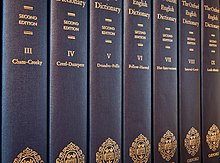New English Dictionary

Seven of the twenty volumes of the printed version of the second edition of the Oxford English Dictionary
|
|
| Country | UK |
|---|---|
| Language | English |
| Published | 1884 |

Second Edition
|
|
| Editor | John Simpson and Edmund Weiner |
|---|---|
| Country | United Kingdom |
| Language | English |
| Subject | Dictionary |
| Publisher | Oxford University Press |
|
Publication date
|
1989-03-30 |
| Pages | 21,730 |
| ISBN | |
| OCLC | 17648714 |
| 423 19 | |
| LC Class | PE1625 .O87 1989 |
The Oxford English Dictionary (OED) is a descriptive dictionary of the English language, published by the Oxford University Press. It traces the historical development of the English language, providing a comprehensive resource to scholars and academic researchers, as well as describing usage in its many variations throughout the world. The second edition came to 21,728 pages in 20 volumes, published in 1989.
Work began on the dictionary in 1857, but it was not until 1884 that it began to be published in unbound fascicles as work continued on the project, under the name of A New English Dictionary on Historical Principles; Founded Mainly on the Materials Collected by The Philological Society. In 1895, the title The Oxford English Dictionary (OED) was first used unofficially on the covers of the series, and in 1928 the full dictionary was republished in ten bound volumes. In 1933, the title The Oxford English Dictionary fully replaced the former name in all occurrences in its reprinting as twelve volumes with a one-volume supplement. More supplements came over the years until 1989, when the second edition was published. Since 2000, a third edition of the dictionary has been underway, approximately a third of which is now complete.
The first electronic version of the dictionary was made available in 1988. The online version has been available since 2000, and as of April 2014 was receiving over two million hits per month. The third edition of the dictionary will probably only appear in electronic form; Nigel Portwood, chief executive of Oxford University Press, thinks it's unlikely that it will ever be printed.
As a historical dictionary, the Oxford English Dictionary explains words by showing their development rather than merely their present-day usages. Therefore, it shows definitions in the order that the sense of the word began being used, including word meanings which are no longer used. Each definition is shown with numerous short usage quotations; in each case, the first quotation shows the first recorded instance of the word that the editors are aware of and, in the case of words and senses no longer in current usage, the last quotation is the last known recorded usage. This allows the reader to get an approximate sense of the time period that a particular word has been in use, and additional quotations help the reader to ascertain information about how the word is used in context, beyond any explanation that the dictionary editors can provide.
...
Wikipedia
